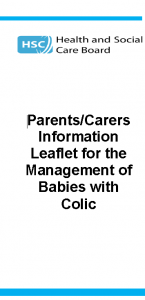
What is colic?
Colic is a condition where there are repeated bouts of excessive crying in a baby who is otherwise healthy. The definition doctors use is “a baby crying for more than three hours a day, for more than three days a week, for at least three weeks.” Colic is common and distressing. It usually goes away by the age of 3-4 months.
In some babies a period of restlessness in the evening may be all that you notice. In some babies with severe colic the crying may go on for many hours throughout the day (and/or night). However, babies with colic are fine between bouts of colic. They feed well, grow well, and do not show any other signs of illness.
Facts about colic
- It occurs in both formula fed and breast fed infants
- It is common – affecting up to 20% of infants
- The cause or causes of colic are very poorly understood
- Maternal smoking has been shown to be associated with infantile colic
- Exclude common causes of excessive crying e.g. hunger, thirst, wet/dirty nappy, baby feeling too hot or too cold.
- Try holding the baby.
- Burping post feeds.
- Gentle motion (pushing pram or ride in the car).
- “White noise” (vacuum cleaner, hairdryer etc).
- Bathing in warm bath.
- Baby massage-your health visitor may be able to teach you how to do this.
- CRY-SIS support group can offer support for families with an excessively crying, sleepless and demanding baby. Website address: www.cry-sis.org.uk.
- Colic is usually something that settles after 3-4 months and you should be reassured that you are not doing anything wrong and your baby is not rejecting you.
- Many of the treatments for colic aim to work on the baby’s gut, either by reducing any excess gas or by helping to break down milk because the baby has a deficiency of an enzyme called lactase. There is no good evidence to support either of these theories and so it is recommended that the products listed below should NOT be prescribed for the management of colic. Should a parent or carer wish to try any of these products they are available to buy from pharmacies e.g. Infacol®, Dentinox Colic Drops®, Colief®, low lactose formulas such as comfort milks, lactose free formulas, gripe water.
Parent and carers need support
When your baby is colicky you need to work out ways to cope. Suggestions include:
- If it is possible take turns with your partner to look after the baby and go outside for a break.
- Ask friends or relatives for support. Let them hold your baby while he/she is crying. They can manage this for a short time, knowing that you are having a break and that you will be able to take over again soon.
- When you are “off duty”, distract yourself perhaps with music played loud enough to drown out the noise of crying (a portable player with earplugs is good for this).
- Talk over your experiences with other parents and share coping strategies.
- Seek advice from your GP or health visitor.
- Remember that colic tends to improve at about 6 weeks and generally goes away around 3-4 months.
- Never ever shake a baby. Shaking a baby in a moment of frustration can cause serious harm or death.
Caring for a screaming baby who can’t be soothed is extremely distressing. If you feel that you are getting too upset, if you can, try to take some time out. Suggestions include:
- Put your baby in a safe place, such as a cot, and leave the room. Check on the baby every 5 minutes. Pick them up again when you begin to feel calm again.
- Walk around the house or go outside.
- Relax your body by dropping your shoulders, clenching and unclenching your fists and stretching your back, arms and legs.
- Have a drink (non-alcoholic) and something to eat, if you can manage it.
When to seek advice from a health care professional
If the baby
- is vomiting
- has diarrhoea or constipation
- is not gaining sufficient weight
- has a high temperature
- has eczema
- is not feeding properly
- appears unwell or sick in any way
